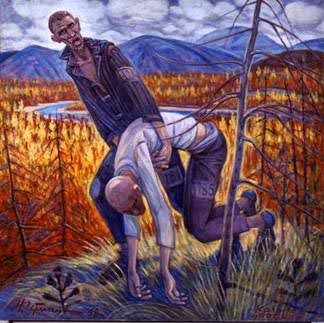Exhibition Opening: Gulag Collection Reveals Conditions of Soviet Labor Camps
15.02.2011 / 15:42 | Aktualizováno: 07.10.2011 / 19:24
(This article expired 16.02.2012 / 01:00.)
Chargé d’Affaires of the Czech Republic Daniel Kostoval opened the Gulag Collection by Ukrainian artist Nikolai Getman at the Embassy of the Czech Republic on February 24, 2011, at 7 pm. The collection features a selection of 15 paintings depicting the harsh lives of political prisoners in the Soviet forced labor camps in the 1940’s and 1950’s. Lee Edwards of the Heritage Foundation and Chairman of the Victims of Communism Memorial Foundation presented brief remarks at the opening reception.
 GULAG was the acronym for the infamous Soviet bureaucratic institution Glavnoe Upravlenie ispravitel’no-trudovykh Lagerei (Main Administration of Corrective Labor Camps). This branch of the secret police oversaw the Soviet forced labor camp and internal exile system. The Gulag system was a vast network of forced labor camps that were used to repress any political opposition to the Communist state and provide labor to fuel the Soviet Union’s economy. Gulag camps existed throughout the Soviet Union, but the largest camps lay in the most extreme geographical and climatic regions of the country. Millions of innocent people were incarcerated in the Gulag, serving sentences of many years of hard labor without adequate food, clothing, shelter, tools, or clean water. The combination of endemic violence, extreme climate, hard labor, meager food rations, and unsanitary conditions led to extremely high death rates in the camps.
GULAG was the acronym for the infamous Soviet bureaucratic institution Glavnoe Upravlenie ispravitel’no-trudovykh Lagerei (Main Administration of Corrective Labor Camps). This branch of the secret police oversaw the Soviet forced labor camp and internal exile system. The Gulag system was a vast network of forced labor camps that were used to repress any political opposition to the Communist state and provide labor to fuel the Soviet Union’s economy. Gulag camps existed throughout the Soviet Union, but the largest camps lay in the most extreme geographical and climatic regions of the country. Millions of innocent people were incarcerated in the Gulag, serving sentences of many years of hard labor without adequate food, clothing, shelter, tools, or clean water. The combination of endemic violence, extreme climate, hard labor, meager food rations, and unsanitary conditions led to extremely high death rates in the camps.
Gulag survivor Nikolai Getman (1917-2004) created the acclaimed paintings in his collection, an unparalleled visual record of the Soviet penal camps that held more than 14 million political prisoners―many of whom died in captivity or upon release. Once freed in 1953 after eight years of forced labor in Siberia and Kolyma, Getman began painting the scenes in secret. He devoted decades of his life to putting his visions of the Gulag on canvas. When he died in August 2004 at the age of 86, he left behind images of communism’s cruel inhumanity that he hoped should never be forgotten.
Photo credit: Artist Nikolai Getman, Escape, oil on canvas
About the Project:
Democracy and Human Rights: Lessons from the Past for the Current Czech Foreign Policy
Based on her own historic experience, the Czech Republic holds human rights and democracy very dear. Calling upon the international community to follow suit, the Czech Republic is a staunch advocate of respect for human rights and democracy in various places in the world where these are under threat. The numerous activities in this field, where the Czech Republic is involved, are portrayed in the Embassy´s project “Democracy and Human Rights: Lessons from the Past for the Current Czech Foreign Policy.” The various events put together within this project include exhibitions, conferences, documentary and feature film screenings, and lectures focusing namely on the country’s totalitarian past, its current human-rights-promotion priorities and, topically, on the rights of women and children.
Upcoming events:
March 24, 7 pm
Recording Voices and Documenting Memories: The NCSML’s Oral History ProjectThe presentation focuses on a two-year oral history project of the National Czech and Slovak Museum and Library (Cedar Rapids), aiming to capture and preserve the stories of Czechs and Slovaks who fled their homeland during the Cold War.
March 29, 7 pm
Documentary screening: Tomorrow There Will Be…
This film interpretation of the recognized opera performance portrays the trial with Milada Horakova, one of the most prominent Czechoslovak political prisoners, executed by the Communists in 1950.
Date TBC
Documentary Screening: Forgotten Transports to Estonia
This unique documentary by the Czech director Lukas Pribyl is based on the recollections of Czech Jewish eyewitnesses deported to concentration camps and ghettos in Estonia.
Location of the events: Embassy of the Czech Republic, 3900 Spring of Freedom St, NW, Washington, DC 20008.
R.S.V.P. to the e-mail: czech_events@yahoo.com
For further information:www.mzv.cz/washington




